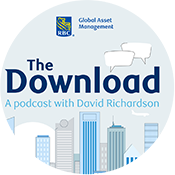In this week’s economic update, we examine the latest economic indicators coming from the U.S. and Canadian economies – specifically, we unpack the encouraging signs of growth in both markets, how their performance is contrasting in some ways, and what this means for the likelihood of rate cuts over the rest of the year.
We are also sharing the latest update on the Canadian housing market from RBC Economics. There are expectations of a bumpy ride over the spring months, but there are some positives in the outlook and a long-term view driven by interest rates.
Lastly we are sharing the most recent episode of The Download, which explores some of the lessons learned from the economy over the past year, and how they can be applied for the future.
Economic Update
Global equities have continued to perform well as of late - but more noteworthy has been the breadth of the rally, with a variety of sectors (and not just technology) enjoying significant gains. As a result, markets outside the U.S. have also performed better, with Canada, for example, recently outperforming the U.S. We view this broadening as a healthy sign as it suggests growing confidence in the investment outlook and portfolio performance that may be less reliant on a narrow part of the market. Below, we turn our attention to the anticipation of interest rate cuts in North America, despite the diverging paths of the Canadian and U.S. economies.
U.S. and Canadian economies diverging on key metrics
Canada has thus far avoided a recession. Its most recent real gross domestic product (GDP) figure was around 1% in the last quarter of 2023. But this modest growth masks some underlying economic weakness. Canadian real GDP per-capita, which accounts for the country’s strong population growth, has been in decline for over a year now. Weak consumer spending, business investment, and lower job growth have slowed the economy, partially offset by strong exports. Recent U.S. economic data has painted a different story, generally exceeding projections. In February, U.S. real GDP grew at an annual rate of 3.2%, with the per capita rate showing similar strength. At the same time, the U.S. labour market has remained relatively tight, which continues to support consumer spending. Though manufacturing sector activity had been on a downtrend from pandemic era peaks, it has picked up in recent months.
Inflation rates going in moderately different directions
The economic divergence in Canada relative to the U.S. has also been on display in recent inflation readings. Canada’s consumer price index (CPI) report for February, released over the past week, revealed lower than expected inflation for the second month in a row. There was a broad easing in price pressures, with the exception being shelter related costs including rents, mortgage interest, and the expenses tied to owning a home. In contrast, the U.S. has witnessed a modest reacceleration in inflation over the last two months, slightly exceeding expectations.
Interest rate cuts remain on the table
Despite these differences, both the Bank of Canada and the U.S. Federal Reserve have telegraphed the potential for rate cuts in 2024. Policymakers at the Bank of Canada recently indicated that cuts could be appropriate this year if the economy evolves in-line with current forecasts.
The case for lower interest rates in Canada has become more convincing as recent economic data point towards moderating inflation. On the other hand, the argument for rate cuts seems less compelling in the U.S., given the economic strength that has been maintained amid higher rates. Nevertheless, Federal Reserve Chairman Jerome Powell reiterated this past week that the Fed believes it may be appropriate to cut interest rates at some point this year. In response to questions on the recent reacceleration in inflation, Powell noted that inflation continues to trend lower despite the recent “bumps in the road”. Markets are currently expecting three cuts this year in both Canada and the U.S., with the first one occurring as early as June.
Summary
The key takeaway is that rate cuts are a real possibility in both Canada and the U.S., even if the rationale and extent of these policy moves might be debated based on the current state of the two economies. Historically speaking, an environment characterized by declining interest rates tends to be supportive for investment returns. The strong equity market performance in recent months may reflect some of this optimism, though we would not be surprised to see markets continue to push higher, at least until some future developments prompt a reassessment of the outlook for inflation, growth, and interest rates.
Bumpy recovery for Canada’s housing market

February offered valuable clues on the direction Canada’s housing market is taking. Improving sentiment among buyers and sellers - no doubt stoked by growing expectations the Bank of Canada’s next move will be a rate cut - halted the series of monthly price declines since last summer. But this more upbeat outlook isn’t yet translating into a steady recovery in activity.
This week, we’re sharing the latest Canadian housing market update from Robert Hogue (Assistant Chief Economist at RBC) – click here to read more.
.
The Download – Lessons learned about the economy

In the latest episode of The Download, David Richardson (Managing Director and Head, Enterprise Strategy, RBC Global Asset Management) and Daniel Chornous, CFA (Managing Director and Chief Investment Officer) discuss a number of economic topics – including whether a recession has been avoided, the problem with inflation expectation, and how equilibrium supports having a long-term plan for your investments.
If you’re interested in a deeper dive and commentary on these themes, this 30-minute podcast episode is for you! You can access the episode whether you find your podcasts, or by clicking here.
As always, we are available to connect with you personally. Please don’t hesitate to contact us at 519-822-2024 or elineskyschuett@rbc.com.
